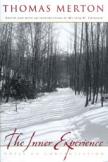A Bridge Crossed
The Inner Experience is a significant addition to Thomas Merton’s (1915-68) books in print. In this text Merton, the most prolific and widely read Christian spiritual author of the 20th century, gives an orderly approach to his thought on contemplation available in no other text. Further, the first four chapters are a superb general introduction to Christian spirituality—amazing, since the text was written in 1959, several years before the spiritual renewal prompted by the Second Vatican Council (1962-1965).
Merton readers are once again indebted to the Rev. William Shannon. Shannon, a Catholic priest and former chancellor of the Diocese of Rochester, is the pre-eminent Merton scholar: author and editor of numerous books on Merton’s life and writing, general editor of the five volumes of Merton letters and founding president of the International Thomas Merton Society. And Shannon has done a masterful job on this manuscript, accomplishing the four goals set by the Merton Literary Trust and articulated in his Introduction: a careful editing of the text, a clarification of how it got to be as it is, a positioning of it in its proper historical place in the Merton corpus and an indication of its importance in the oeuvre.
The published text, not available in book form until now, has an interesting history. Merton seems to have substantially completed it in 1959, though adding very minor revisions in 1968. But not being completely satisfied, he noted it was not to be published “as a book.” However, the Merton Literary Trust allowed excerpts in Shannon’s Thomas Merton’s Dark Path (Farrar, Straus, Giroux, 1981) and Lawrence Cunningham’s Thomas Merton: Spiritual Master (Paulist, 1992), as well as serialization in Cistercian Studies.
Shannon’s Introduction highlights the significance of the book within the Merton corpus. Merton wrote two books on contemplation prior to 1959 and two afterward. Shannon states that The Inner Experience may be seen as a bridge between the early and later Merton:
In this work he makes clear that contemplation is not a compartment of life, but rather the way to integrate one’s life into a single whole. The distinction between the false self and the true self that he touched on briefly in Seeds of Contemplation receives fuller expression. Additionally, we see here for the first time Merton forging a link with Eastern religious thought, in striking contrast to his facile dismissal of oriental religions in Seeds of Contemplation. One discovers also a shift away from the dualisms that marred his earlier works. There are clear indications of his “return to the world” with a sense of compassion for people that clearly marks a departure from the excessive “world-denying position” of some of the earlier writing.
This “link with Eastern religious thought” makes the publication of the text especially apt for our times. In 1959, three years before the Second Vatican Council, Merton was fostering respect for Eastern religious traditions: “Everywhere in the East, whether in Hinduism or Buddhism, we find that deep, unutterable thirst for the rivers of Paradise. Whatever may be the philosophies and theologies behind these forms of contemplative existence, the striving is always the same: the quest for unity, a return to the inmost self united with the Absolute, a quest for Him Who is above all, and in all, and Who Alone is Alone.” Merton even dared to assert that non-Christian cultures, such as the Buddhist culture, were superior to Western cultures for “disposing man more naturally for contemplation.”
I confess to a special fondness for the text. In 1971 I went to Gethsemani to do research for my dissertation on Merton. I had read widely in Merton and had been attracted by his thought. However, I was also somewhat mystified by it, not able to grasp it sufficiently for use in my dissertation. Happily one of the monks gave me a copy of the manuscript of The Inner Experience. It was a godsend, finally providing me the guide to Merton I needed.
Granted that Merton did eventually abandon some of its awkward terminology and that he further developed his major themes in subsequent writing, The Inner Experience still provides the best road map to Merton’s approach to contemplation and, indeed, to contemplation in general. Anyone interested in the centrality of contemplation in Christian living will treasure this text.
This article also appeared in print, under the headline “A Bridge Crossed,” in the October 13, 2003, issue.








